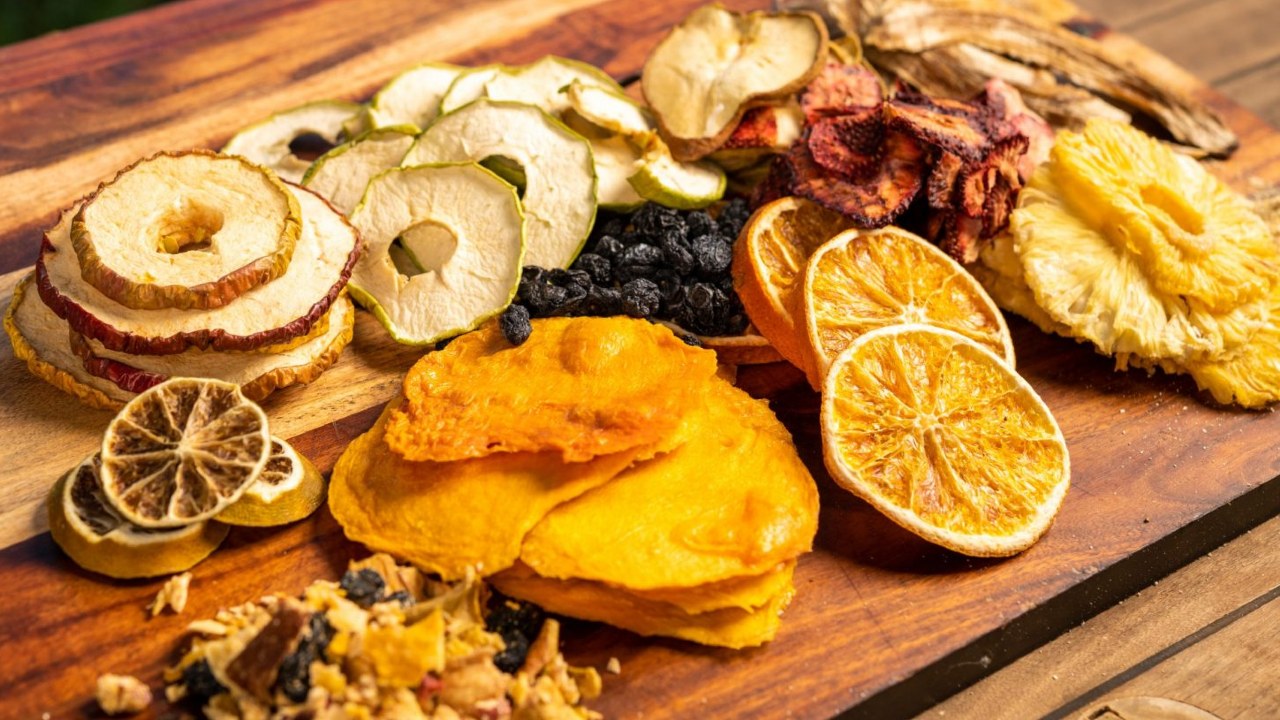Fruit is one of the agricultural products that have many health benefits, and you can eat it as a snack or sometimes as a whole meal. In the seasons of the year, there are different types of fruits, but if you want to eat oranges in summer or strawberries in winter, what should you do? The solution to this problem is to use dried fruits. This delicious food can be used as a lovely snack with a long shelf life.
What is dried fruits?
The main difference between fresh fruits and dried fruits is in the appearance, taste, and moisture of each of them. Dried fruits are actually fresh fruits whose moisture has evaporated due to heat and have a wrinkled appearance. These fruits can be dried whole like plums, grapes, or apricots, or sliced like apples, pineapples, and oranges. In both cases, there will be no difference in the very high benefits of these delicious snacks.
All kinds of dried fruits
For drying fruit, you have almost no special restrictions and you can dry and use any fruit (except very juicy and sensitive fruits like watermelon). However, some fruits are more popular for drying than others, and in this section, we will introduce 12 of them along with their benefits.
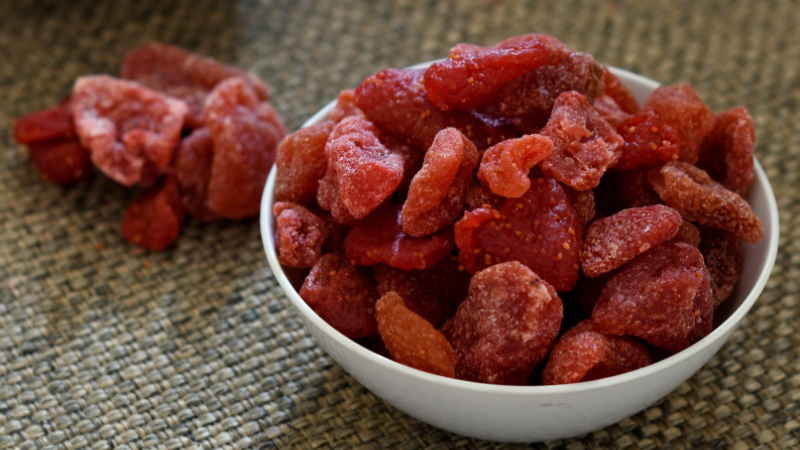
Dried Strawberry
Strawberry is one of the most delicious and delicate fruits in the world, which is rich in enzymes, antioxidants, and minerals such as sodium, magnesium, iron, silica, potassium, and substances such as fiber, and vitamins B and C. To prepare dried strawberries, this fruit is cut into thin slices and exposed to heat. Dried strawberries prevent the occurrence of heart disease, stroke, and diabetes and have a great effect in treating high blood pressure and constipation.
Dried pineapple
This fruit is one of the fruits that is rich in various vitamins and minerals, including vitamin C, various antioxidants, Bromelain (a type of substance with anti-inflammatory benefits), fiber, collagen, copper, manganese, iron, and potassium. Pineapple is a very delicious dried fruits. This fruit has a great effect in treating many diseases such as digestive problems, increasing metabolism and fat burning, preventing osteoporosis, rejuvenating the skin with collagen, improving blood circulation, strengthening the immune system, and treating joint diseases.
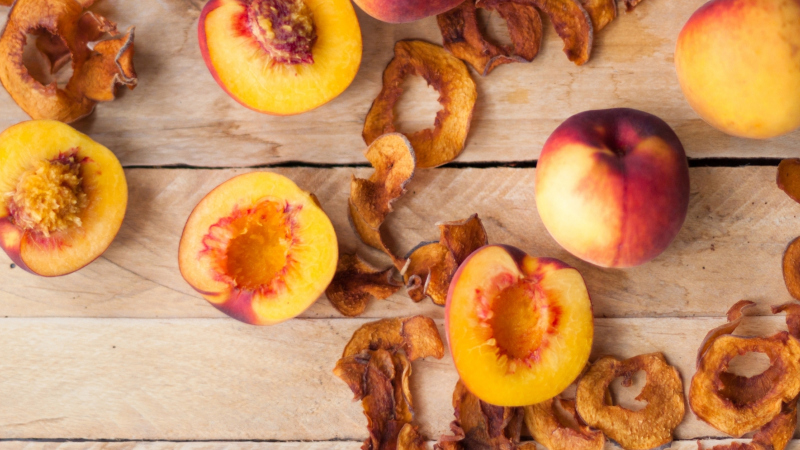
Dried peach
It is not difficult to prepare dried fruits, but perhaps the easiest one is to prepare dried peaches. This fruit is cut into thin slices and dried for 24 to 48 hours with very mild heat. This fruit is rich in iron, vitamin C, fiber, chlorogenic acid, neochlorogenic acid, potassium, magnesium, phosphorus, zinc, copper, manganese, and calcium. Dried peaches have a great effect in strengthening hair growth, helping the fetus grow properly during pregnancy, losing weight, strengthening the immune system, treating anemia, preventing cancer, and maintaining bone health.
Dried Apples
Like peaches, apples are one of the easiest types of dried fruit that you can prepare even at home. Fresh and dried apples have almost the same benefits. This fruit is rich in iron, magnesium, calcium, potassium, vitamins A, C, and group B vitamins, phosphorus, and compounds that are useful for calming the nerves. This fruit is very useful for maintaining healthy teeth, treating joint diseases, regulating blood pressure, maintaining skin freshness, and improving heart and digestive problems.
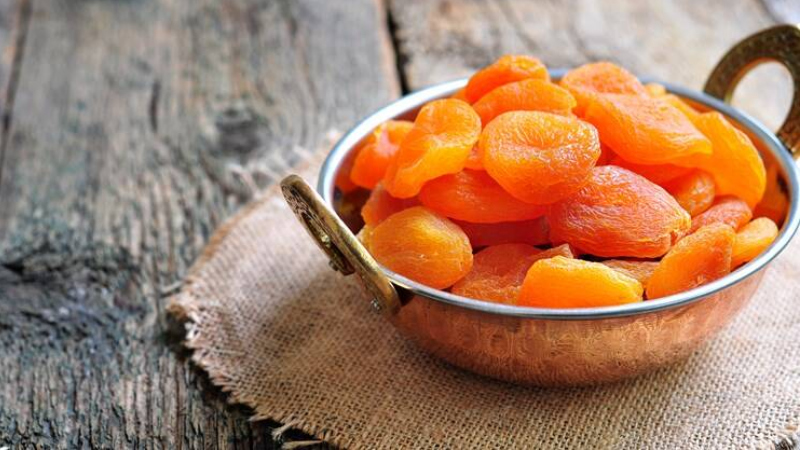
Dried Apricots
This dried fruit is very popular among Iranians and is one of the oldest types of dried fruit that is consumed as a snack in Iranian food culture. Apricot is a sweet and delicious summer fruit that contains significant amounts of fiber, vitamins A, C, and E, iron, potassium, antioxidants Lutein and zeaxanthin, magnesium, folic acid, selenium, and protein. This fruit is effective in the treatment of eye diseases, anemia, constipation, and diabetes and helps to improve the weight loss process, slow down skin aging and improve bone density.
Dried Bananas
Bananas are fruits that are rich in potassium. This mineral is the first thing that catches your attention in bananas. The abundant potassium present in bananas along with large amounts of fiber plays a very effective role in improving digestive problems, especially intestinal problems. In addition to potassium and fiber, this dried fruit contains large amounts of carbohydrates, vitamin C, various antioxidants, iron, and folic acid. Consuming dry bananas is effective in treating constipation, and anemia caused by menstruation, increasing metabolism and weight loss, improving kidney health, improving heart problems, and strengthening the immune system.
Dried Figs
This dried fruit, like dried apricot, is one of the oldest types of dried fruits in Iranian food culture. Figs contain vitamin C, vitamin K, potassium, magnesium, phosphorus, calcium, fiber, and manganese. Dried figs are a very tasty snack that can be eaten alone or with tea. The ingredients in dried figs are effective in strengthening the immune system, maintaining bone health, losing weight, preventing hair loss, preventing Alzheimer’s disease, reducing blood sugar in diabetic patients, treating constipation, and maintaining the health of the digestive system.
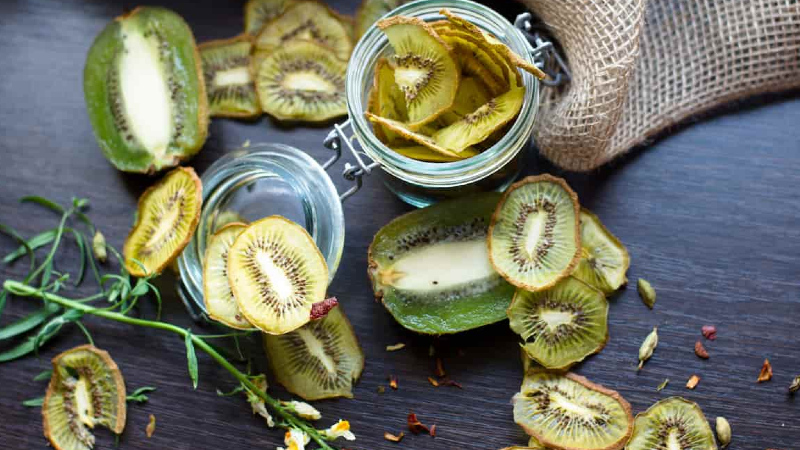
Dried kiwi
Kiwi is one of the fruits that is a bit difficult to prepare dry. Dried kiwi contains large amounts of antioxidants and is one of the fruits that are very effective in reducing the risk of cancer. This fruit contains a high amount of vitamin C, potassium, calcium, vitamin E, amino acids, copper, magnesium, zinc, and phosphorus. Consuming dry kiwi is effective in preventing various cancers, especially breast cancer, colon cancer, and stomach cancer. This fruit also helps in weight loss, better hair growth, preventing rapid graying of hair, improving respiratory problems, reducing stress, and improving skin condition.
Dried Mango
Mango is one of the most delicious tropical fruits that has many fans. Mangos are very tasty either in the form of dried fruit or in the form of fresh fruit, and you can consume them as a delicious snack. Mango contains significant amounts of fiber, vitamin A, calcium, potassium, iron, various antioxidants, protein, and B vitamins. The ingredients in this fruit are effective in treating eye diseases (presbyopia), reducing bad blood cholesterol, strengthening the immune system, treating skin diseases such as eczema, helping to digest food better, and preventing premature aging.
Dried Melon
This delicious dried fruit is one of those snacks that if you try it once, you will become one of its fans. Melon is a very tasty summer fruit that can be used both fresh and dried. Dried Melon is rich in vitamins A and C, carotenoids, various minerals, fiber, antioxidants, and pectin (a type of strong fiber), which helps to treat diabetes, improve digestive problems and indigestion, strengthen the immune system, lose weight, and grow. It is suitable for the fetus during pregnancy and helps to treat constipation.
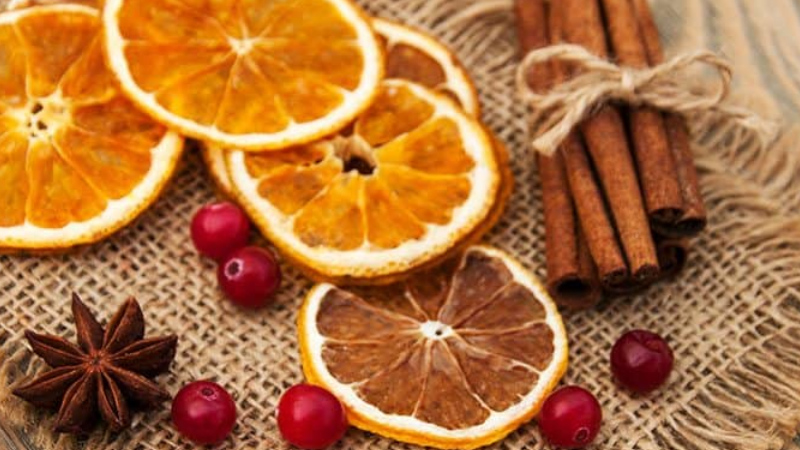
Dried Orange
Portugal is one of the most popular fruits around the world. The benefits of these dried fruits are many, just like its fresh type. Dried oranges contain large amounts of vitamin C and various antioxidants, along with other substances such as potassium, folic acid, fiber, beta-carotene, and collagen. This delicious dry fruit is effective in treating many body problems including dry skin, constipation, hair loss, heart diseases, cholesterol, and high blood sugar.
Dry fruit storage methods to increase shelf life
Unlike fresh fruits, dried fruits have a much longer shelf life, but still, it is better to store these fruits in special conditions so that they do not become rotten and unusable. To store dried fruits, observe the following points:
• Keep dried fruit in the refrigerator. The hot environment will cause the fruits to rot and, in some cases, mold.
• The container in which you store dried fruit should be dry and clean.
• Preferably use glass containers to store dried fruits.
• These fruits should not be exposed to sunlight or humidity.
• The best time to store these snacks is a maximum of 4 years.

